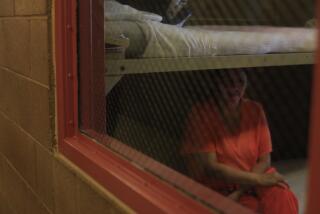Prison hospitals prepare for hunger strike patients
SACRAMENTO — California’s prison hunger strike is now in its sixth week, and the number of inmate protesters requiring medical care has increased significantly.
The court-appointed agency in charge of prison medical services is clearing out hospital beds in some prisons to make room for the anticipated space that will be needed to keep up with those trends.
That means ailing inmates who aren’t on a hunger strike at the state prison in Corcoran have been transferred to local hospitals for care, said agency spokeswoman Liz Gransee. Meanwhile, at prisons that don’t have licensed medical care units, inmates who decide to resume eating after prolonged fasting are also being sent out to hospitals for that care, Gransee said.
To date, the majority of cases involving medical care involve dehydration, abdominal pain and complaints of dizziness, she said.
According to medical guidelines created by foreign governments for monitoring hunger strikes in other countries, after a month without food, protesters can experience nerve damage that causes difficulty swallowing and vomiting. After 40 days, the expected effects include progressive confusion, incoherence, loss of vision and hearing, and bleeding.
In preparation for that phase of the protest, Gransee said, the prison medical office is stepping up its daily monitoring of reports from the six prisons where protesters remain.
The official tally of hunger strikers Tuesday was 287, including 133 who have refused prison meals for 36 days. Prison administrators said 93 inmates, suffering from dehydration and abdominal pain, have required medical attention over the last seven days, including six sent to outside hospitals. Most of 93 treated resumed eating.
ALSO:
Legislature begins to talk about prison bailout
Lawmakers seek safeguards on prison sterilizations
On Twitter: paigestjohn
paige.stjohn@latimes.com
More to Read
Get the L.A. Times Politics newsletter
Deeply reported insights into legislation, politics and policy from Sacramento, Washington and beyond. In your inbox three times per week.
You may occasionally receive promotional content from the Los Angeles Times.











